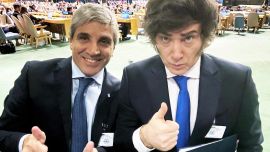Jair Bolsonaro was sworn in as Brazil’s president on New Year’s Day, taking the reins of Latin America’s largest and most populous nation with promises to overhaul myriad aspects of daily life and put an end to business-as-usual governing.
For the far-right former Army captain, his inauguration was the culmination of a journey from a marginalised and onceridiculed congressman to a leader who many Brazilians hope can combat endemic corruption as well as violence that routinely gives the nation the dubious distinction of being world leader in total homicides.
Seeking to make his mark immediately, the newly installed president hit the ground running on his first day of business, rushing through changes to put a conservative stamp on Argentina’s giant neighbour.
The quick reshaping spoke to Bolsonaro’s desire to reform Brazil while in his initial electoral honeymoon phase, before fractures could appear in his atypical Cabinet or his ad-hoc legislative alliances.
And in the first hours of his leadership of the nation, Bolsonaro targeted Brazil’s indigenous groups, descendants of slaves and the LGBT community with executive orders.
Meanwhile, stock markets jumped more than three percent to record closes as new Cabinet ministers reinforced the government’s intention to privatise state-owned companies. Holdings in Brazilian arms makers surged in reaction to Bolsonaro’s plans to loosen gun controls.
Once inside Congress on January 1, Bolsonaro and his vice-president, retired general Hamilton Mourão, took the oath of office. Bolsonaro then read a short speech reiterating many of the far-right positions he staked out during the campaign.
He promised to combat the “ideology of gender” teaching in schools, “respect our JudeoChristian tradition” and “prepare children for the job market, not political militancy.”
“I call on all congressmen to help me rescue Brazil from corruption, criminality and ideological submission,” he said.
A short time later, Bolsonaro spoke to thousands of supporters outside, promising to “free Brazil” from socialism and political correctness.
During Tuesday’s speech, Bolsonaro stopped at one point, pulled out a Brazilian flag and wildly waved it, prompting roars from the crowd.
“Our flag will never be red,” Bolsonaro said, a reference to communism. “Our flag will only be red if blood is needed to keep it green and yellow.”
‘PURGE’
After taking office, Bolsonaro wasted no time in seeking to put his stamp on the nation.
One of the executive orders issued late Tuesday, hours after his inauguration, will likely will make it all but impossible for new lands to be identified and demarcated for indigenous communities. Areas set aside for “quilombolas,” as descendants of former slaves are known, are also affected by the decision.
Another order removed the concerns of the LGBT community from consideration by the new Human Rights Ministry.
Bolsonaro’s chief-of-staff also said Thursday that the government is starting a purge of contracted employees to get rid of those who don’t share its ideology. The government “will clean the house,” Onyx Lorenzoni said at a press conference.
“It’s the only way to govern with our ideas, our concepts and to carry out what Brazil’s society decided in its majority,” said Lorenzoni, who now holds ministerial rank and is seen as the second most powerful member of the Executive after Bolsonaro.
The sweep will target contract workers deemed sympathetic to the centrist and leftwing parties that have ruled Brazil for most of the period since the country shucked off military dictatorship in 1985.
Bolsonaro and his team routinely identify those parties – particularly the Workers’ Party (PT) that governed between 2003 and 2016 – derogatively as “Socialists” or “Communists.”
Lorenzoni said that 300 workers in his ministry had been dismissed under the purge, but added some might be re-hired if they passed an “evaluation” of their ideological leanings. The same shake-up could be extended to other ministries, he said.
“It doesn’t make sense to have a government with a profile like ours to keep on people who support another way of thinking, another political system,” he said. “We are having the courage to do what maybe the previous government failed to do: clean the house right at the beginning.”
Bolsonaro also tasked his government secretary with the monitoring of international organisations and non-governmental organisations in Brazil. The Americas division of Human Rights Watch expressed concern at the move, saying it showed a misunderstanding of “the independent role these entities have in an open and democratic society.”
INDIGENOUS
In a move favourable to his allies in agribusiness – which have long criticised giving large swathes of lands to the indigenous – Bolsonaro transferred the responsibilities for delineating indigenous territories from the Justice Ministry to the Agriculture Ministry.
Bolsonaro, a former Army captain and longtime congressman, said during his presidential campaign that he would stop making what he calls concessions to native Brazilians and Quilombolas.
“Less than one million people live in those places isolated from the real Brazil,” he tweeted Wednesday. “They are explored and manipulated by non-profits. Together we will integrate those citizens and give value to all Brazilians.”
The Justice Ministry previously handled demarcation of indigenous lands through the FUNAI agency, which also oversees other initiatives for indigenous groups such as healthcare, housing and language preservation. Bolsonaro’s order is raising uncertainties about FUNAI by shifting it to a new ministry for “family, women and human rights” that is headed by an ultraconservative evangelical pastor.
Observatorio do Clima, a network of 45 Brazilian civil society groups, criticised the executive orders, calling them “only the first step on meeting Bolsonaro’s campaign promises of dismantling environmental governance, stripping indigenous peoples of their rights and opening up indigenous lands for business.”
“The attack on FUNAI goes beyond the wildest dreams of the rural caucus, who had tried for years to pass a constitutional amendment transferring the demarcation of indigenous lands from the president to Congress,” the nonprofit organisation said. “Bolsonaro solved the problem by transferring them directly to farmers.”
The far-right leader said last year that he also wants to annul land demarcation decisions made by previous administrations, but legal experts say recent Brazilian Supreme Court rulings could block such a move.
Incoming Health Minister Luiz Henrique Mandetta also suggested on Wednesday that there will be spending cuts in healthcare for the indigenous.
“We have figures for the general public that are much below what is spent on healthcare for the indigenous,” he said, without providing details.
LGBT COMMUNITY
In removing LGBT concerns from the responsibilities of the Human Rights Ministry, Bolsonaro did not name any agency to consider such issues.
A lawyer active in the LGBT community, Juliana Maggi, described that move as “an affront,” though she added that constitutional changes would be needed to overturn gay rights to recognised partnerships and family.
Damares Alves, the new human rights minister, did not discuss the LGBT order in her first address on the job, but the evangelical pastor has insisted over the years that “the Brazilian family is being threatened” by diversity policies. On Wednesday, she said: “The State is lay, but this minister is terribly Christian.”
Under the new administration, Alves added, “Girls will be princesses and boys will be princes. There will be no more ideological indoctrination of children and teenagers in Brazil.” He also tweeted that “It’s a new era in Brazil: Boys wear blue and girls wear pink!”
Brazilian LGBT activist Symmy Larrat said she doesn’t expect reasonable treatment from the Bolsonaro administration.
“The Human Rights Ministry discussed our concerns at a body called secretariat of promotion and defence of human rights. That body just disappeared, just like that. We don’t see any signs there will be any other government infrastructure to handle LGBT issues,” she said.
The Folha de S. Paulo newspaper reported this week that Bolsonaro will later announce the closing of an agency within the Education Ministry that has been aimed at promoting diversity in public schools and universities.
New Foreign Minister Ernesto Araujo criticised the LGBT community as being “those that say they are not men and women.”
ECONOMIC REFORM
Elsewhere, on the markets, hopes of a turnaround for Latin America’s biggest economy – which has been limping ever since exiting its worst-ever recession two years ago – have been spurred by promises that Bolsonaro’s team will cut spending and debt.
The news president has handed much of the control over to his economy minister, Paulo Guedes, a US-trained freemarket advocate.
Guedes on Wednesday reaffirmed his determination to cut Brazil’s public spending and debt, with reform of the unsustainable pension system a priority.
In Brazil, workers can often take retirement in their mid-50s, earlier than in comparable countries, and with pensions that are often around 70 percent of their final salaries. Maintaining that system consumes around a third of government spending – a proportion that will only go up as Brazil ages – and increases its debt. Analysts say that without reform, the system will push the country to insolvency.
Bolsonaro said Thursday he expected allowing private control of rail lines, airports and ports would “quickly” bring in around US$1.8 billion in investment and boost infrastructure.
Brazil ‘needs its own Guantánamo,’ says Bolsonaro ally
Brazil “needs its own Guantánamo” to lock up criminals, Rio de Janeiro’s state governor Wilson Witzel, an ally of new far-right President Jair Bolsonaro, said Thursday, referring to the US military base in Cuba used as an extraterritorial prison.
“We need to put terrorists in places where society is completely free of them,” Witzel said in a speech to police.
The new governor, who took office this week as part of an electoral wave favouring far-right politicians that elevated Bolsonaro to the presidency, is given to making controversial statements.
For instance, just after being elected in October last year, he suggested police snipers could kill armed “criminals” – including anybody spotted carrying weapons, even if noone was being threatened.
He and Bolsonaro have pledged to crack down on crime that is plaguing Brazil. The country in 2017 recorded nearly 64,000 murders.
BRAZIL, ARGENTINA WILL TAKE ‘DIFFERENT DIRECTION’ TO PREVIOUS GOVERNMENTS, DECLARES BOLSONARO
Brazil’s new president, Jair Bolsonaro, told President Mauricio Macri this week that their two nations would “walk together in different directions than those of the last governments,” as he assumed office in Argentina’s giant neighbour.
Macri – who did not attend the farright leader’s inauguration in Brasilia on New Year’s Day, sending Foreign Minister Jorge Faurie in his stead – posted a message to Bolsonaro on Twitter, in which he expressed his desire to work together for the good of their two countries.
The Argentine leader, who is on vacation with his wife and daughter in Patagonia, said: “I want to send my best wishes to Jair Bolsonaro on the day he becomes president of Brazil, our friend and brother nation. I trust that our governments will continue to collaborate for the prosperity of both our peoples.”
Bolsonaro, now the leader of Argentina’s biggest trading partner, responded a day later: “Thank you for your words, president. Without a doubt Brazil and Argentina are going to walk together in different directions than those of the last governments. A big hug!”
The two leaders have a bilateral meeting scheduled for January 16 in Brasilia, where they are expected to discuss trade, the future of the Mercosur bloc and how to tackle the economic and humanitarian crisis in Venezuela.
So far, the omens do not look good. For his first visit overseas as president, Bolsonaro has chosen to travel to Chile, rebuffing the usual tradition of new Brazilian leaders visiting Argentina. Also, back in October, incoming Finance Minister Paulo Guedes said “Argentina is not a priority, neither is the Mercosur,” though he later backtracked on his comments.


























Comments